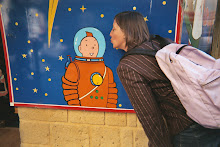
Where is your sanctuary, the place where you go to be renewed? When I think of sanctuary, sometimes I think of a church, but more often I think of a peaceful place with trees, sun and water. I’ve just been to such a place in
Tanzania called Jacobsen’s Beach. I went with Trina, Seth, and a young family from
Canada (Doug, Deanna, Maddie and Keza). Okay, so it may not be everyone’s idea of a sanctuary depending on whether you can survive a five hour drive matatu style, live without running water (the pump was broken), endure with limited electricity (the generator ran for a few hours each night), and adapt to wild monkeys who look cute, but go on the rampage for food (including in the kitchen and the Land Rover).

But how do you feel about sitting on a beautiful beach reading or snorkeling in crystal clear (warm!) water gazing at black fish with fluorescent blue polka dots or jumping off cliffs into the water or eating fresh fish and the best pineapple in the world on an outcropping overlooking the water? It’s important for each of us to find those places where we can rest so we can continue on doing what we do, and in my case, reflect on what I will be doing both here and in the future.

Ironically, (Josiah, am I using the word correctly here?), we met about 800 Burundians at the Tanzania/Burundi border who were seeking their own type of sanctuary. They were refugees, just like my friends the Kaburas in Portland, who are returning to Burundi after 36 years in camps in Tanzania. Of course, not all of them have been in Tanzania that long, some have grown up, married, and had children. The camps are closing down and sending roughly 2000 refugees back to Burundi each week. I counted at least 18 big UNHCR trucks in the caravan we followed. I tried to imagine what they must be feeling, perhaps anticipation and a bit of fear. Deanna pointed out a child to Maddie that was about her age (3 ½). She explained to Maddie that this girl was moving to Burundi without a home. In fact, they are temporarily sheltered in fenced compounds. Can you imagine trying to establish a home with no land and few resources? I pray Burundi becomes a true sanctuary.

 Emile, our health education specialist, his wife, Séraphine, and their daughter, Graciella, had me over for dinner last weekend. Took my second taxi ride (still at muzungu prices…although I found out gas is nearer to $9 a gallon, rather than $7). Again, I was served a lovely meal which included this salad, something they know I appreciate.
Emile, our health education specialist, his wife, Séraphine, and their daughter, Graciella, had me over for dinner last weekend. Took my second taxi ride (still at muzungu prices…although I found out gas is nearer to $9 a gallon, rather than $7). Again, I was served a lovely meal which included this salad, something they know I appreciate.













